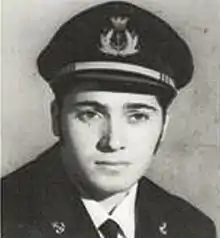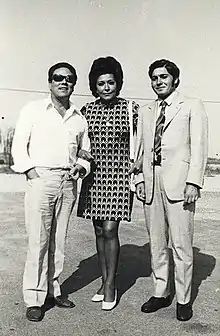Giacomo Romano Davare
Giacomo Romano Davare (born 2 July 1945, Alcamo, Italy) is an Italian writer, stage director and teacher.

Biography
Davare was born in Alcamo, in the province of Trapani in 1945; he is an actor, stage director, writer, lyricist, composer and songwriter. After getting the high school diploma, he has been navigating worldwide for three years as a sea captain; later he graduated in Economy and Commerce, qualifying as a certified accountant.[1]
After winning a competition for teaching, he taught Applied Mathematics in Commercial Technical Institutes, first in Alcamo, then in Lecco and finally in Morbegno, in the province of Sondrio; later he became a headmaster in high schools.[1]
In 1973, with a literary article on Il Secolo d'Italia, he started a long series of publications which included novels, poems, essays and various dramas, works that are catalogued in National libraries and in those of theatrical companies in Europe, United States and Australia;[2] later he published artiche in different magazines and newspapers, such as Il Giornale di Sicilia, Romagna, Rivista Teatro, Corriere della Valtellina, Cultura di destra.[1] Finally, he collaborated with University of Milano-Bicocca for Italian teachers traineeship (TFA).[3]

In 1976, thanks to his artistic experience with Filodrammatica in the Church of Saint Anne (Alcamo), he founded Piccolo Teatro di Alcamo; after his transfer in Lombardy, he has been the artistic director of Compagnia Piccolo Teatro delle Valli of Morbegno (Sondrio) since 1983. He has directed more than one hundred plays for Piccolo Teatro of Alcamo and Piccolo Teatro delle Valli of Sondrio, with a greater propensity for classical authors like Sophocles, Shakespeare, Molière, Goldoni, Pirandello, Cechov, Ibsen, T. Wilder, T.S. Eliot and Arthur Miller.[1] He has been politically committed, as he first supported the M.S.I.(Italian Social Movement) and later A.N. National Alliance (Italy), where he covered the office of provincial president; he was an administrator in the province of Trapani and Sondrio, and also a member of the BIM (Bacino imbrifero montano) of Sondrio.
Prizes and acknowledgments
Davare has won, or been mentioned, in various Italian literary contests:
- Premio Federico II, Palermo 1970
- Premio Martin Luther King, Civitavecchia 1977
- Premio Giacomo Arnò, Naples, 1979[4]
- Fragmenta d'oro for theatre, Rome 1985
- Carlo Alianello for edited poetry, Sibari 1989
- Premio nazionale Histonium for narrative, Vasto 2003[4]
- "Premio migliore regia" at the theatre contest of San Costantino Calabro for the play "Tre sull'altalena" by Lunari (agosto 2006)
- Premio Speciale Gatal (2011) for his theatrical activity
- Ghitakos for Essays, Athens 2013[4]
- Premi Letterari "N. Giordano Bruno – XXII edition" and "Amici della Sapienza – Speciale Scuola XVIII edition", December 2014 (as Meritorius for culture, art, tourism and solidarity)
- Special Mention at Premio Letterario Casentino 2016
- Fifth classified at "Premio Internazionale Michelangelo Buonarroti", Serravezza 2016[4]
- Prize of merit assigned by Premio letterario internazionale Montefiore (7th edition) for his essay "Chi era Enrico IV?" (September 2017)[5]
- Finalist at Premio Internazionale Michelangelo Buonarroti 3rd edition, Serravezza november 2017
- International Prize (Premio internazionale) Talenti Vesuviani: assigned PREMIO SPECIALE LEGALITA (Naples, 2017)
- Honorable Mention at the 2nd Premio Artistico-letterario Internazionale al femminile "Maria Cumani Quasimodo" (2018)
- Mention of highest literary merit assigned by the Associazione Artistica Culturale "Accademia degli Artisti", Premio Letterario internazionale Golden Books Awards 2018 in collaboration with Umberto Soletti editor, 19 May 2018
- Member of Accademia Ferdinandea of Catania.[2]
- Knight of the International Confederation Knights Crusader of Malta (2003)
Works
- Il potere e la croce: a trilogy; Palermo: Thule, 1999
- Bruto figlio di Cesare (a drama, with an introduction by Gennaro Malgieri); Palermo: Thule, 1977
- Anche il silenzio tace: poems; Palermo: Thule, 1981
- Il buco grigio (an essay-enquiry on the essence of thought through the analysis of the logical circuits of our mind); Firenze libri, 1989
- Guida alla didattica del «Far teatro»; Editore: Nuovi Autori; 1990,[6] Genere: arti ricreative. spettacolo. sport[7]
- Più forte che la rivoluzione; Palermo: Thule, 19..
- Eolia (a novel on navigation); Firenze: L'Autore Libri, 1993
- L'inverno passerà presto: a drama in 2 acts and 4 scenes; translated in Russian by Monica Ferrante, music by Fausto Cannone, introduction by Teresa Rizzo, afterword by Tommaso Romano; Milan; Nuovi Autori, 1994[6]
- Via Mazzini: a comedy in three acts; Palermo: Thule, 1997
- Ciullo d'Alcamo: a historical drama in 2 acts and 5 scenes (with an introduction by Giuseppe Cottone); Palermo: Thule, 1998
- Dietro il cancello: a drama in 2 acts; Palermo: Thule, 1999
- 1:Il sangue dei martiri: a historical drama in 2 acts; Palermo: Thule, 1999 (Is a part of: Il potere e la croce, trilogy)[6]
- L'ala spezzata del destino; Pescara: Tracce, 2002
- Il favo delle api: a fable in 2 acts with songs; Palermo: Thule, 2003
- L'onore di Bice: giallo vergognosamente comico in due atti, un prologo e un'anteprima; Palermo: Thule, 2005
- Il teatro dell'anima: storia della drammaturgia moderna nell'esperienza di alcuni protagonisti, by Giacomo Romano Davare and Manuel Davare; Firenze: Atheneum, 2007
- Il teatro dell'anima. Educare al teatro, educare con il teatro; Editore: Firenze Atheneum, Collana: Collezione Oxenford, 2007[7]
- Anima profonda: articoli e saggi critici (1973–2002) di Giacomo Romano Davare; with an introductive text by Tommaso Romano: Parola creativa e azione teatrale nell'opera di Giacomo Romano Davare; Palermo: Thule, 2010
- Le voci nel camino (stories); Edizioni L'Autore Libri Firenze, 2011[7]
- Torna a volare libero, gabbiano: a drama in 2 acts; Palermo: Thule, 2011
- Prima che il treno passi, a drama
- Molière didattico: translations of the comedies Le Saccenti and IL Tartufo; Palermo: Thule, 2013[6]
- Teatro: Maschera e specchio della civiltà occidentale; Ed. Firenze Atheneum; Collana: Collezione Oxenford, 2014
- Le interrelazioni sociali nel teatro, Rivista Teatro, Milan
- Il potere e l'anima: a trilogy of Giacomo Romano Davare; music by Fausto Cannone; Palermo: Thule, 2014[6]
- Le fiabe teatrali: dove vai Cherry Brown; L'uccellino blu; Palermo: Thule, 2015
- Chi era Enrico Quarto? Europa Edizioni Roma; Collana: Edificare universi, 2015[7]
- Il professore e il magistrato; Europa Edizioni, Collana: Edificare universi, 2017
- Il ferro di cavallo; Europa Edizioni, Collana: Edificare universi, 2020
References
- "DAVARE GIACOMO ROMANO Nato ad Alcamo nel 1945, s'imbarca giovanissimo come ufficiale di coperta e naviga tre anni toccando i porti di tutti i continenti" (PDF). Tommasaromano.it. Archived from the original (PDF) on 1 December 2017. Retrieved 2 January 2018.
- "Il professore e il magistrato – Giacomo Romano Davare | Europa Edizioni". Europaedizioni.it (in Italian). Archived from the original on 1 December 2017. Retrieved 2 January 2018.
- "Lydia Gaziano .jpg". Google Docs. Retrieved 2 January 2018.
- Giacomo Romano Davare, Il professore e il magistrato p.380, Roma, Europa edizioni, 2017.
- Pegasus, Associazione Culturale. "I vincitori – Premio Montefiore". Premiomontefiore.it (in Italian). Retrieved 2 January 2018.
- "Risultati ricerca". Internetculturale.it (in Italian). Retrieved 2 January 2018.
- "Davare Giacomo Romano Libri". Unilibro.it. Retrieved 2 January 2018.
Sources
- Davare, Giacomo Romano (2017). Il professore e il magistrato p.380. Roma: Europa edizioni.
- "ENTRA NEL 30° ANNO LA STORIA DEL PICCOLO TEATRO DELLE VALLI DI MORBEGNO".
- "Il professore e il magistrato – Giacomo Romano Davare". Archived from the original on 1 December 2017. Retrieved 25 November 2017.
- "Davare Giacomo Romano Libri".
- "Davare, Giacomo Romano". Archived from the original on 1 December 2017. Retrieved 25 November 2017.
- "5° classificato ex aequo Giacomo Romano Davare".
- "Premio letterario internazionale Montefiore".
- ""Erano pure figli miei" di Arthur Miller secondo Giacomo Romano Davare". YouTube.
| Wikimedia Commons has media related to Giacomo Romano Davare. |
External links
- "Giacomo Romano Davare".
- ""Erano pure figli miei" di Arthur Miller secondo Giacomo Romano Davare".
- "Il Piccolo teatro delle Valli porta all'oratorio Molière".
- "Alcamo-Parrocchia Sant'Anna, religiosità e cultura".
- "Recensioni a Giacomo Romano Davare, "Moliere didattico", "Il potere e l'anima"".
- "Presentazione del libro Il professore e il magistrato di Giacomo Romano Davare". Archived from the original on 1 December 2017. Retrieved 25 November 2017.
- "Ultime notizie Benemeriti dell'accademia Amici della Sapienza".
- "Il Piccolo Teatro delle Valli sul palco per beneficienza".